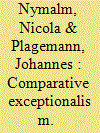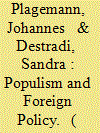|
|
|
Sort Order |
|
|
|
Items / Page
|
|
|
|
|
|
|
| Srl | Item |
| 1 |
ID:
164450


|
|
|
|
|
| Summary/Abstract |
Existing research on exceptionalism in foreign policy suggests a number of confrontational features making it a threat to peaceful international relations. Largely based on US and European cases, and hardly ever taking a comparative approach, this literature overlooks a variety of exceptionalisms in non-Western countries, including so called “rising powers” such as China and India. A comparison between exceptionalist foreign policy discourses of the United States, China, India, and Turkey shows that exceptionalism is neither exclusive to the United States, nor a “new” phenomenon within rising powers, nor necessarily confrontational, unilateralist, or exemptionalist. As a prerequisite for comparative work, we establish two features common to all exceptionalist foreign policy discourses. In essence, such discourses are informed by supposedly universal values derived from a particular civilization heritage or political history. In order to systematize different versions of exceptionalism, we then propose four ideal types, each of which reflects exceptionalism's common trait of a claim to moral superiority and uniqueness but diverges across other important dimensions, with implications for its potentially offensive character. The article concludes by formulating a research agenda for future comparative work on exceptionalist foreign policy discourses and their repercussions for great power relations and global politics.
|
|
|
|
|
|
|
|
|
|
|
|
|
|
|
|
| 2 |
ID:
164680


|
|
|
|
|
| Summary/Abstract |
What kind of foreign policy do populists execute once in power? Based on the existing literature, we conceptualize populism as a set of ideas whose two core elements are anti-elitism and antipluralism. From this we develop a set of hypotheses regarding both substantive aspects of foreign policy as well as foreign policy–making processes of populist leaders in government. An analysis of Indian Prime Minister Narendra Modi's foreign policy record serves as a first plausibility probe of our hypotheses. We find that our concept of populism carries most explanatory value in the procedural aspects of foreign policy making as well as in its communication, less so in those aspects relating to the goals or substance of foreign policy. Whereas foreign policy under Modi's populist leadership is highly centralized and personalized, the traditional foreign policy establishment, including most notably the Ministry of External Affairs, has lost some of its previous authority. Engaging the Indian diaspora abroad emerged as another characteristic of populist foreign policy making. By contrast, the case of India does not confirm our hypothesis regarding a preference of bilateralism over multilateralism, nor does populism necessarily preclude investing in global public goods.
|
|
|
|
|
|
|
|
|
|
|
|
|
|
|
|
| 3 |
ID:
174862


|
|
|
|
|
| Summary/Abstract |
Strong economic growth and assertive political leadership have made India an increasingly prominent player in global governance. Whereas conventional scholarship of India’s foreign policy underlines continuity, this article explores how India’s self-conception has changed across two policy fields (climate change and maritime security). Adopting a role-theoretical approach, we analyze official statements as a mirror of both India’s self-understanding and its view on the roles of significant other actors. Although both issue-areas exhibit change, India’s self-ascribed role has been transformed more profoundly in the maritime domain. Our comparison suggests three factors to particularly induce transformation of rising powers’ roles toward ‘more responsibility’: First, power-sharing is more conducive than burden-sharing; second, issue-areas with strong regional anchors are more likely to induce the adoption of a more responsible role than those areas situated primarily at the global level of politics; and third, positive external role ascriptions are more effective than negative ones.
|
|
|
|
|
|
|
|
|
|
|
|
|
|
|
|
| 4 |
ID:
185990


|
|
|
|
|
| Summary/Abstract |
This article explores the consequences major power rivalries over connectivity investments have for small states in Asia and thereby contributes to a better understanding of small states’ strength and capabilities in an increasingly multipolar world. With reference to the literature on small states, field work, and interviews, the article explores Bangladesh’s remarkable success in reaping the benefits from relations with rivalling major powers over the past decade. Three explanatory factors stand out: first, Bangladesh’s ‘intrinsic’ value to major powers increased; second, its political leadership has been particularly adept in dealing with such major powers; and third, systemic factors – the number and kind of major powers with stakes in Bangladesh – has been beneficial. Thus, Bangladesh’s foreign policy responses suggest that the competitive nature of connectivity investments substantially improves the autonomy of recipient countries. Moreover, contrary to theoretical expectations, the intensification of major power rivalry so far has not constrained Bangladesh’s autonomy. Thus, the case study also exhibits infrastructure investments’ limitations as a power resource. Nonetheless, the potentially most beneficial cooperation schemes involving rivalling major powers have become less likely. Consequently, the case study dampens incipient hopes in turning competing connectivity schemes into major power positive-sum games.
|
|
|
|
|
|
|
|
|
|
|
|
|
|
|
|
|
|
|
|
|